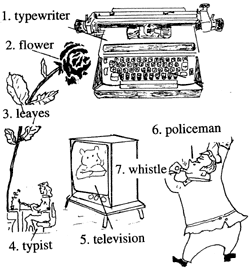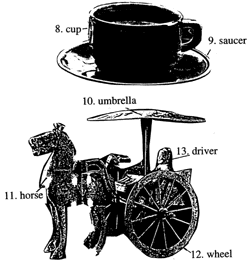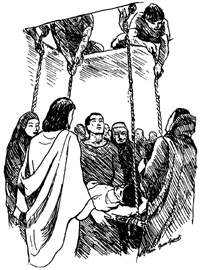Unit 31: Adverbs of Degree
Pictured Words
New Words

| 1.typewriter
|
| 2.flower
|
| 3.leaves
|
| 4.typist
|
| 5.television
|
| 6.policeman
|
| 7.whistle
|

| 8.cup
|
| 9.saucer
|
| 10.umbrella
|
| 11.horse
|
| 12.wheel
|
| 13.driver
|
Nouns
Sayings
My cup is so full.
Influenza is a virus that puts one in bed for so long before getting well again.
Aids is not the only virus that makes us so very weak and tired.
That university had its beginning in only a canvas tent.
How the secretay smiled as she took the sponge and wiped off the ink from that very paper.
How clearly will we be able to see the video or television to night?
The only flow in this drain is so slow as to be like a sponge.
The very cup from which the chief drank before he went to bed.
Adverbs of Degree
The degree with which an action is expressed may be seen in the words: "how", "very", "only" or "so":
How
how is it possible?
how may the son of woman be upright?
how long will you make my life bitter .
how the evil man goes free.
how he makes the light of his cloud to be seen.
Very
at the very thought of it.
you are very old.
they saw that his pain was very great.
Only
only two things do to me.
only put your hand on him.
only do not put a finger on the man himself.
So
and so a hollow-minded man with set wisdom.
so that he may have pleasure.
so man goes down to his last resting place.
so that he may give decision.
so I came out in the hope of meeting you.

Let Down Through The Roof
And it came about that on one of these days he was teaching;
and some Pharisees and teachers of the law were seated there, who had come from every town of Galilee and Judaea and from Jerusalem;
and the power of the Lord was with him, to make those who were ill free from their diseases.
And some men had with them, on a bed, a man who was ill, without power of moving;
and they made attempts to get him in and put him before Jesus.
And because of the mass of people, there was no way to get him in;
so they went up on the top of the house and let him down through the roof, on his bed, into the middle in front of Jesus.
And seeing their faith he said, Man, you have forgiveness for your sins.
And the Scribes and Pharisees were having an argument, saying, Who is this, who has no respect for God?
who is able to give forgiveness for sins, but God only?
But Jesus, who had knowledge of their thoughts, said to them, Why are you reasoning in your hearts?
Which is the simpler: to say, You have forgiveness for your sins;
or to say, Get up and go?
But so that you may see that on earth the Son of man has authority for the forgiveness of sins, (he said to the man who was ill,) I say to you, Get up, and take up your bed, and go into your house.
And straight away he got up before them, and took up his bed and went away to his house giving praise to God.
And wonder overcame them all, and they gave glory to God;
and they were full of fear, saying, We have seen strange things today.
Additional Reading
Anyone who has seen houses in dry countries will have a good idea of how they are made.
It is quite the normal thing to put large pieces of wood parallel across the roof.
Then, the spaces between them have branches put in and kept there by hard earth to keep out any rain that may come.
There is a small slope for draining off the rain.
That was the sort of roof made on this house.
So, it was very simple to take out the mud and let this man into the house by the roof.
Nor was it uncommon for that to be done.
Boxes for the dead were often let into the house in that way.
The thing that was different was the fact that the man's friends went to so much trouble.
They had faith.
Now, Jesus often said that without faith no help could be given.
It is surprising how often he said to people your faith has made you well.
When he made the observation of their faith he said, "You have forgiveness for your sins".
We may wonder why he made this statement first.
It was because there was a deeply seated belief in that day that illness was the reward of sin.
So strong was this belief that the ill person felt in the grip of some sin or other and so could never be made well.
Jesus first gave the man a completely new thought and his faith became stronger.
This also took away the grip of the teachers of the law.
They had all sorts of rules that were hard to keep.
For example, they said that to make people free from their diseases on the Sabbath was a sin.
They said this could be done only if the person's life was in danger.
It was possible to keep the person from getting worse, but not to do anything on the Sabbath which made him healthy.
So you could put a simple cover on a wound but not give any medical help.
It was also said by these teachers that to take up any kind of material on the Sabbath was against the law.
So, they said that it would be wrong for the man to take up his bed.
Still more important was the idea that only God was able to give forgiveness for sins.
To them this was the greatest of all the errors.
We must not be surprised, then, that the people were very happy to see themselves free of the crushing conditions that they had been given by these hard to keep laws.
and they were full of fear, saying, "We have seen strange things today".
The teachers of the law, however, were not so happy.
This was not only putting their laws in doubt, it was also making their authority less certain.
From then on they took special steps to see that they got free of the teachings of Jesus.
In fact, at the last they sent him to the cross for the division that came about between their teachings and his desire to give every man a rest from such detailed controls.
Helpful Notes
| Pharisees and teachers of the law
| the religious leaders.
|
| Galilee and Judaea
| places in Palestine.
|
| power of moving
| ability to move the parts of the body.
|
| forgiveness for sins
| removal of blame for wrong doing.
|
| draining off the rain
| letting water run away to the ground.
|
| boxes for the dead
| units for persons who have died.
|
| crushing conditions
| hard systems to put up with.
|
| putting in doubt
| making of little effect.
|
Interesting Facts and Records.
Luke, The Medical Man
There is a story from the time of the Romans that Luke was a painter.
That is, he put oils and paint onto canvas to make a picture.
There is a painting of Mary, the mother of Jesus, in a big church in Spain.
It is said that it was the work of Luke.
Luke was the only writer of books in the New Testament who was not a Jew.
He was probably a Greek, for he wrote very good Greek.
But, his finest quality is that he was a medical man who kept good records.
When he put pen to paper, it was with care.
We have no knowledge of his training.
There were no universities or hospitals as we have them now.
The most common illness in those parts was malaria.
Such things as influenza had another name, and Aids and viruses were not known.
In his training, he would have had real life experience with an older teacher.
The writings of Luke were mainly for other ethnic groups than the Jews.
These had the name, "Gentiles".
Both the Gospel and the Book of Acts were written for a Roman with a high scale position in the Government.
There were hardly any records taken from the Old Testament.
Luke wrote without much theory.
It was for the every day person.
Luke said that Jesus often spoke with God.
He then set in motion important steps like choosing his followers.
At that time, women had a low position in the social scale.
A Jew had a morning saying: "I thank God I have not been born a Gentile, I am not in servitude and I am not a woman".
That was a true picture of the low position of women at that time.
But, Luke had a higher view.
His words about women were said with a smile.
He spoke of the widow at Nain and the woman who put a sweet perfume on Jesus feet.
Luke was a special friend of Paul on his long journeys.
He was true to him even in prison.
No doubt he put the sponge to work on his back when the whips had whistled about him.
Only Luke has told us of the loss of the ship at an island in a wild sea.
That would make an interesting video or television movie now.
These two men took their drinks from the same cup and put their beds beside each other, whether with comfort or not.
Luke was Paul's secretary who put his feather pen to paper to give us accounts that now make easy reading because he wrote for persons like us.